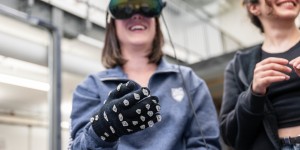UBC's Innovation Partnerships team is your guide into the university’s large research and innovation ecosystem, recognizing opportunities and navigating them to unlock innovation for you.
Whether you’re a company, government agency or non-profit, we are your trusted point of contact, ensuring your partnership journey with UBC is seamless and impactful. We make it easy to collaborate with UBC researchers, access cutting-edge facilities and leverage funding opportunities to drive transformative innovation.
We don’t just facilitate partnerships—we help you explore possibilities, tap into expertise and spark new ideas that drive real-world change.








